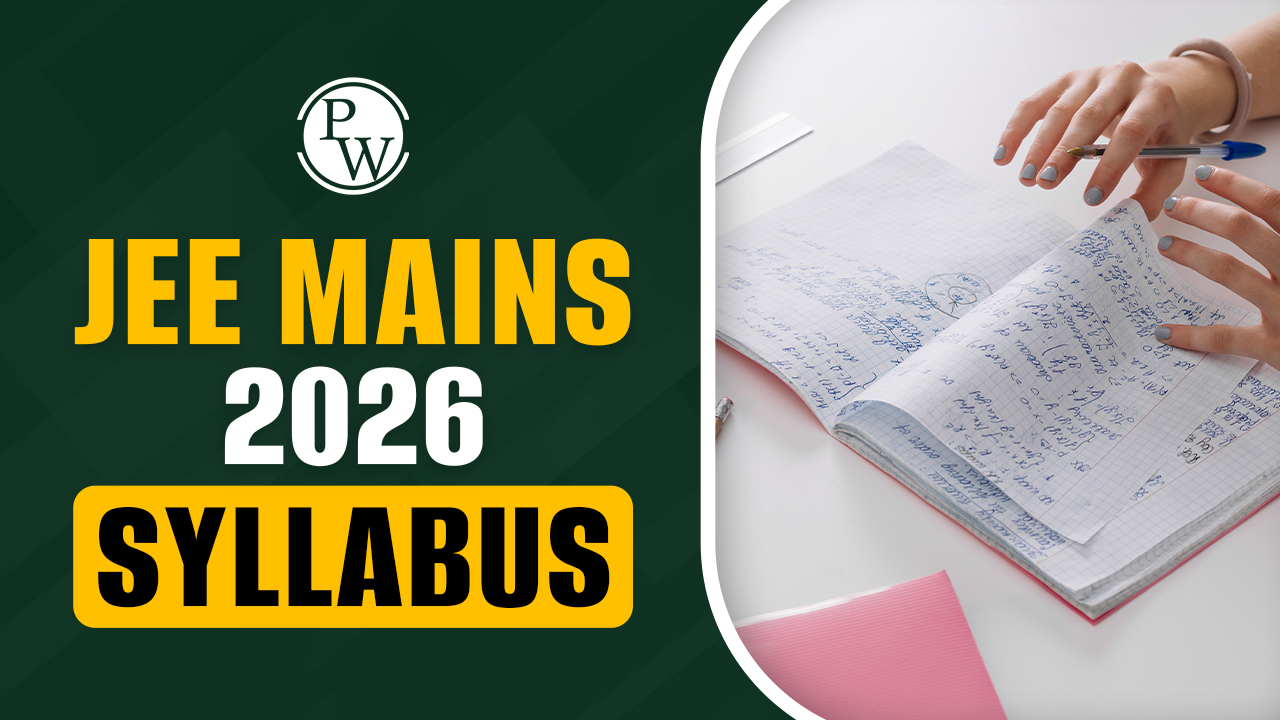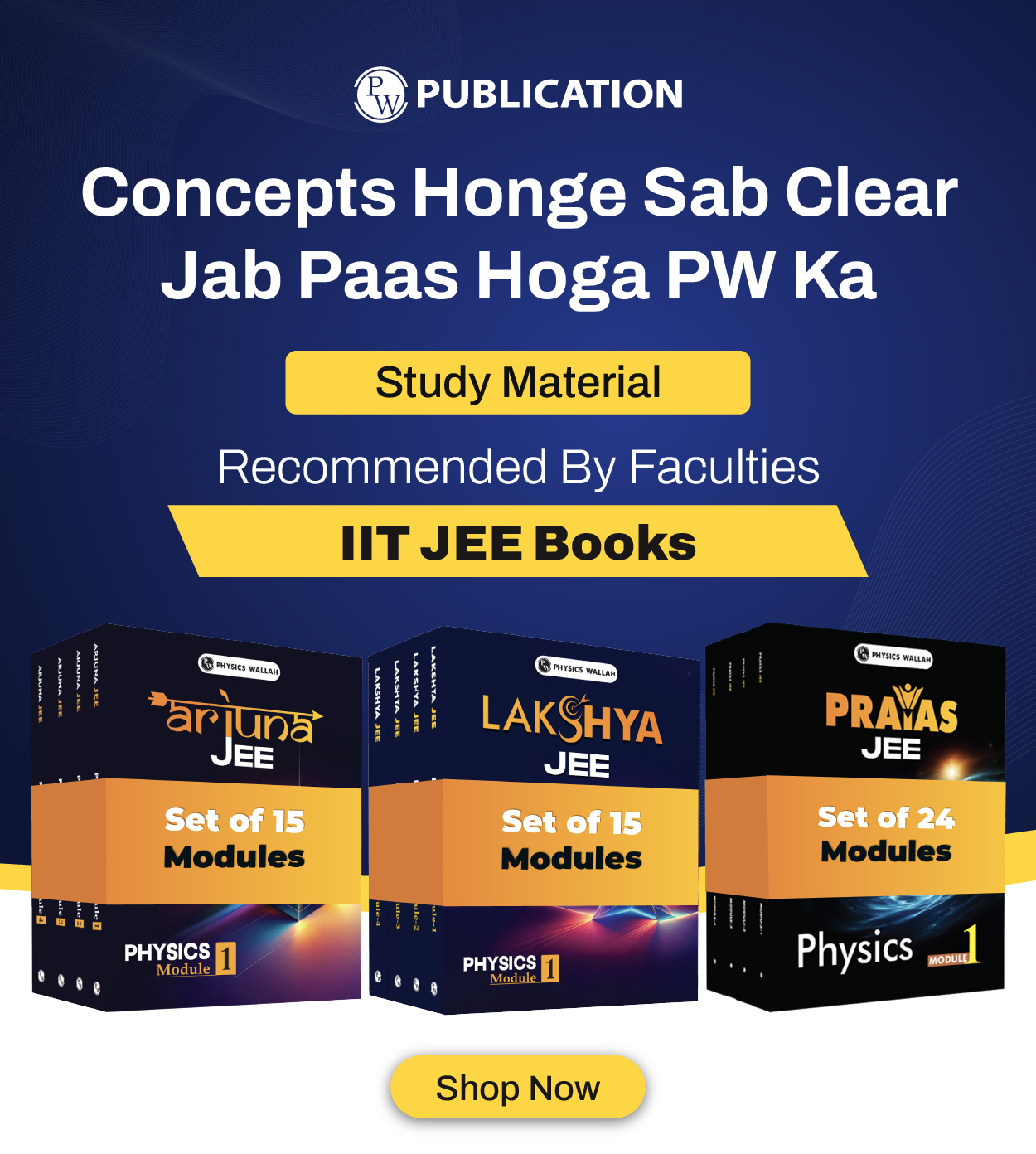JEE Mains 2026 Syllabus: Overview

JEE Mains 2026 syllabus is the roadmap for students aiming to get into top engineering colleges like the IITs, NITs, and IIITs. Prepared by the National Testing Agency (NTA), the jee mains syllabus follows the Class 11 and 12 NCERT curriculum. It includes subjects like Physics, Chemistry, and Mathematics and is designed to test both concepts and applications. We’ll break down the JEE Main syllabus for 2026 in the simplest way. Also, you'll find important topics, subject-wise units, recent changes, and tips to study smart.
Check Out: IIT JEE Books
JEE Mains 2026 Exam
The JEE Main 2026 exam is for students who want to study B.E./B.Tech, B.Arch, or B.Planning courses in engineering colleges. It has two papers:
-
Paper 1: For B.E./B.Tech courses
-
Paper 2A and 2B: For B.Arch and B.Planning
The NTA JEE mains syllabus for these papers is based on topics from both Class 11 and 12.
JEE Mains Syllabus 2025 vs 2026: What Changed?
The jee mains syllabus 2025 was different from the new 2026 version. The NTA removed many topics in 2024 to make the syllabus shorter. This means less stress for students.
Some topics that were removed include:
-
Communication Systems from Physics
-
States of Matter from Chemistry
-
Mathematical Reasoning from Mathematics
These changes make the syllabus of jee mains more focused on important topics.
Check Out: JEE Previous Year Papers
JEE 2026 Syllabus: Physics Section
Physics in the jee 2026 syllabus has 19 main units. Here are the most important ones:
Basic Physics Topics
-
Physics and Measurement: Learn about units, measurements, and errors
-
Motion: Study how things move in straight lines and circles
-
Forces: Understand Newton's laws and how forces work
Advanced Physics Topics
-
Electricity: Learn about electric charges, current, and circuits
-
Light: Study reflection, refraction, and wave properties of light
-
Modern Physics: Understand atoms, nuclei, and electronic devices
Units in Physics:
-
Physics and Measurement – Units, dimensions, errors
-
Kinematics – Motion, velocity, acceleration
-
Laws of Motion – Newton's laws, friction, momentum
-
Work, Energy, Power – Energy conservation, collisions
-
Rotational Motion – Angular velocity, moment of inertia
-
Gravitation – Gravity, satellites, escape speed
-
Properties of Solids and Liquids – Pressure, surface tension
-
Thermodynamics – Heat, work, thermodynamic laws
-
Kinetic Theory – Gas laws, energy of particles
-
Oscillations and Waves – Sound, resonance
-
Electrostatics – Charges, fields, potential
-
Current Electricity – Circuits, resistance, laws
-
Magnetism – Magnetic fields, laws
-
EM Induction and AC – Transformers, AC circuits
-
Optics – Light, reflection, lenses, wave optics
-
Dual Nature of Matter – Photoelectric effect
-
Atoms and Nuclei – Atomic models, radioactivity
-
Electronic Devices – Semiconductors, diodes
Experimental Skills: You’ll need to know how to use basic lab tools like the vernier caliper, screw gauge, and simple pendulum, and understand simple physical experiments. Physics also has a practical section worth 20% of marks. You need to know about 18 key experiments.
Check Out: JEE Main 7 Years (2019 - 2025) Physics PYQs
Chemistry in the JEE Mains 2026 Syllabus
Chemistry is divided into three parts:
Physical Chemistry:
-
Basic Concepts of Chemistry – Moles, equations
-
Atomic Structure – Electrons, orbitals
-
Chemical Bonding – Types of bonds, VSEPR, hybridization
-
Thermodynamics – Enthalpy, entropy, free energy
-
Solutions – Concentration, colligative properties
-
Equilibrium – Chemical and ionic equilibrium
-
Redox and Electrochemistry – Cells, oxidation
-
Chemical Kinetics – Reaction rate, temperature effect
Inorganic Chemistry:
-
Periodic Table – Trends, element blocks
-
p-Block Elements – Group properties
-
d- and f-Block Elements – Transition metals, inner transition
-
Coordination Compounds – Naming, bonding, structures
Organic Chemistry:
-
Basics of Organic Chemistry – Mechanisms, effects
-
Hydrocarbons – Alkanes, alkenes, aromatics
-
Compounds with Halogens/Oxygen/Nitrogen – Reactions and uses
-
Biomolecules – Proteins, DNA, carbohydrates
-
Purification and Testing – Lab techniques
-
Practical Chemistry – Titration, salt analysis
Check Out: JEE Main 7 Years (2019 - 2025) Chemistry PYQs
Mathematics Section Overview
Mathematics has 14 units covering topics from both Class 11 and 12:
Major Units:
-
Sets, Relations, Functions – Venn diagrams, types of functions
-
Complex Numbers, Quadratics – Imaginary numbers, equations
-
Matrices and Determinants – Solving systems of equations
-
Permutations and Combinations – Counting methods
-
Binomial Theorem – Expanding expressions
-
Sequence and Series – Progressions
-
Limits, Continuity, Differentiability – Basics of calculus
-
Integral Calculus – Area under curves
-
Differential Equations – Solving real-world equations
-
Coordinate Geometry – Lines, circles, conics
-
3D Geometry – Points in space
-
Vectors – Directions and operations
-
Statistics and Probability – Mean, median, chance
-
Trigonometry – Angles, identities, inverse functions
Check Out: JEE Main 7 Years (2019 - 2025) Mathematics PYQs
Paper 2 Details for Architecture Students
If you want to study Architecture, you need to take Paper 2A. This paper has three parts:
-
Mathematics (same as Paper 1)
-
Aptitude Test: Tests your understanding of buildings, materials, and design
-
Drawing Test: You need to draw from memory
Students who bring their own drawing materials can take this test.
Changes in JEE Mains Syllabus 2026
The jee mains syllabus 2025 was trimmed down, and jee mains 2026 syllabus continues with the updated topics.
Removed Topics:
-
Physics: Communication systems
-
Chemistry: Surface chemistry, Polymers, Chemistry in everyday life
-
Mathematics: Mathematical Induction, Mathematical Reasoning
These changes help students focus on core topics and reduce the load.
Chapter-Wise Weightage
While the JEE 2026 syllabus is huge, some topics are more important based on past trends.
Physics:
-
Modern Physics – High-scoring( 6-8 questions)
-
Electricity and Magnetism – Frequently asked(5-7 questions)
-
Optics – Concept-based( 3-5 questions)
Chemistry:
-
Organic Chemistry – Reaction mechanisms( 7-9 questions)
-
Equilibrium and Coordination Compounds – Common in papers(3-5 questions)
-
Chemical Balance: 5-7 questions
Mathematics:
-
Calculus and Algebra – High number of questions
-
Coordinate Geometry – Easy to score
Focus more on these to boost your mark.
Check Out: JEE Revision Books
JEE Mains 2026 Syllabus: Complete Guide for Students
Getting ready for JEE Mains 2026? You need to know what topics to study. The JEE Mains 2026 Syllabus covers all the important subjects that will appear in your exam. This guide will help you understand everything about the syllabus.
What is the JEE Mains Syllabus?
The jee mains syllabus is a list of topics you need to study for the exam. The National Testing Agency (NTA) makes this list. It includes topics from Class 11 and Class 12 in three subjects: Physics, Chemistry, and Mathematics.
The nta jee mains syllabus follows the NCERT books you study in school. This makes it easier for students because they already know these topics from their regular classes.
Understanding the JEE Main Syllabus Structure
The jee main syllabus has two main papers:
-
Paper 1: For students who want to study Engineering (B.E./B.Tech)
-
Paper 2: For students who want to study Architecture or Planning
Most students take Paper 1. This paper tests your knowledge in Physics, Chemistry, and Mathematics.
JEE Mains Syllabus 2025 vs 2026: What Changed?
The jee mains syllabus 2025 was different from the new 2026 version. The NTA removed many topics in 2024 to make the syllabus shorter. This means less stress for students.
Some topics that were removed include:
-
Communication Systems from Physics
-
States of Matter from Chemistry
-
Mathematical Reasoning from Mathematics
These changes make the syllabus of jee mains more focused on important topics.
JEE 2026 Syllabus: Physics Section
Physics in the jee 2026 syllabus has 19 main units. Here are the most important ones:
Basic Physics Topics
-
Physics and Measurement: Learn about units, measurements, and errors
-
Motion: Study how things move in straight lines and circles
-
Forces: Understand Newton's laws and how forces work
Advanced Physics Topics
-
Electricity: Learn about electric charges, current, and circuits
-
Light: Study reflection, refraction, and wave properties of light
-
Modern Physics: Understand atoms, nuclei, and electronic devices
Physics also has a practical section worth 20% of marks. You need to know about 18 key experiments.
Chemistry in the JEE Mains 2026 Syllabus
Chemistry is divided into three parts:
Physical Chemistry
This part covers:
-
Basic concepts of chemistry
-
How atoms are built
-
Chemical reactions and energy
-
Solutions and their properties
Inorganic Chemistry
This section includes:
-
The periodic table and elements
-
Metals and their compounds
-
Coordination chemistry
Organic Chemistry
Here you will study:
-
Carbon compounds and their reactions
-
Different types of organic molecules
-
Biomolecules like proteins and vitamins
Mathematics Section Overview
Mathematics has 14 units covering topics from both Class 11 and 12:
Algebra Topics
-
Sets and functions
-
Complex numbers
-
Matrices and determinants
Calculus Topics
-
Limits and derivatives
-
Integration
-
Differential equations
Geometry Topics
-
Coordinate geometry
-
Three-dimensional shapes
-
Vector algebra
Check Out: JEE Question Banks
Paper 2 Details for Architecture Students
If you want to study Architecture, you need to take Paper 2A. This paper has three parts:
-
Mathematics (same as Paper 1)
-
Aptitude Test: Tests your understanding of buildings, materials, and design
-
Drawing Test: You need to draw from memory
Students who bring their own drawing materials can take this test.
How Much Each Topic Matters
Some topics are more important than others. Here's what carries more marks:
High-scoring Physics Topics
-
Modern Physics: 6-8 questions
-
Electricity and Capacitors: 5-7 questions
-
Optics: 3-5 questions
Important Chemistry Topics
-
Organic Chemistry: 7-9 questions
-
Chemical Balance: 5-7 questions
-
Coordination Compounds: 3-5 questions
Key Mathematics Areas
-
Coordinate Geometry
-
Calculus
-
Algebra
These topics appear more often in the exam, so spend extra time on them.
Smart Study Tips for Success
Here are some proven ways to prepare well:
Start with NCERT Books
NCERT textbooks cover the basic concepts you need. Read them carefully and understand each topic before moving to harder books.
Make a Study Plan
The syllabus is big, but you can handle it with good planning. Give more time to topics that carry more marks.
Focus on Understanding
Don't just memorize formulas. Understand why they work. This helps you solve new types of problems.
Mistakes to Avoid During JEE 2026 Preparation
Many students make these mistakes while preparing:
-
Skipping NCERT books and jumping to advanced materials
-
Not giving enough time to high-scoring topics
-
Ignoring practical experiments in Physics
-
Not practicing enough numerical problems
The JEE Mains 2026 syllabus covers a lot of ground, but it's designed to test your understanding of basic concepts. With proper planning and consistent study, you can master all the topics. Remember that the syllabus follows your school curriculum. This means you already have a good foundation. Build on this foundation with focused practice and regular revision.
Start your preparation early, stay consistent, and don't panic about the vast syllabus. Break it down into small parts and tackle one topic at a time. Success in JEE Mains comes from understanding concepts well, not just memorizing them.
Read More: Is It Difficult to Score 150 in JEE Mains?
JEE Mains 2026 Syllabus FAQs
1. What is included in the JEE Mains 2026 Syllabus?
The JEE Mains 2026 Syllabus includes topics from Class 11 and 12 in Physics, Chemistry, and Mathematics. It follows the NCERT curriculum and covers 19 units in Physics, 20 units in Chemistry, and 14 units in Mathematics.
2. Is the jee main syllabus the same for all students?
The JEE Main syllabus has two papers. Paper 1 is for Engineering students and includes Physics, Chemistry, and Mathematics. Paper 2 is for Architecture students and includes additional sections like Drawing and Aptitude tests.
3. Does the NTA JEE mains syllabus follow NCERT books?
Yes, the nta jee mains syllabus is based on NCERT textbooks. This means students can start their preparation with NCERT books from Class 11 and 12.
4. What is the difference between Paper 1 and Paper 2 in the JEE 2026 syllabus?
Paper 1 is for B.E./B.Tech courses and includes Physics, Chemistry, and Mathematics. Paper 2 is for B.Arch/B.Planning courses and includes Mathematics, Aptitude Test, and Drawing/Planning sections.












